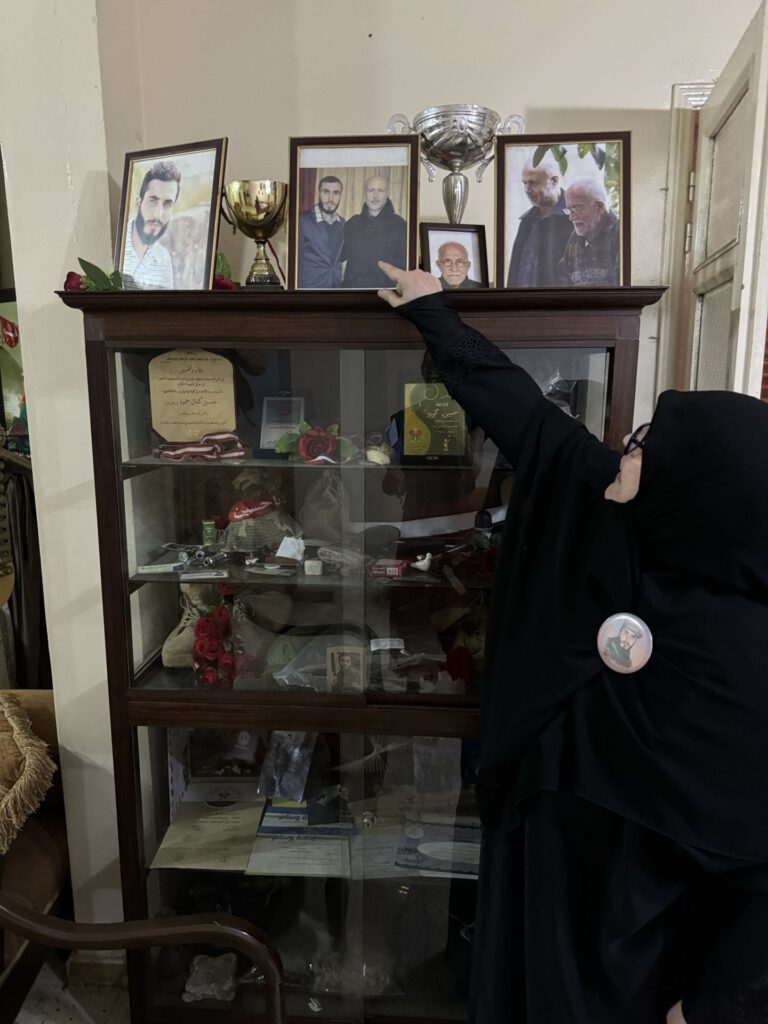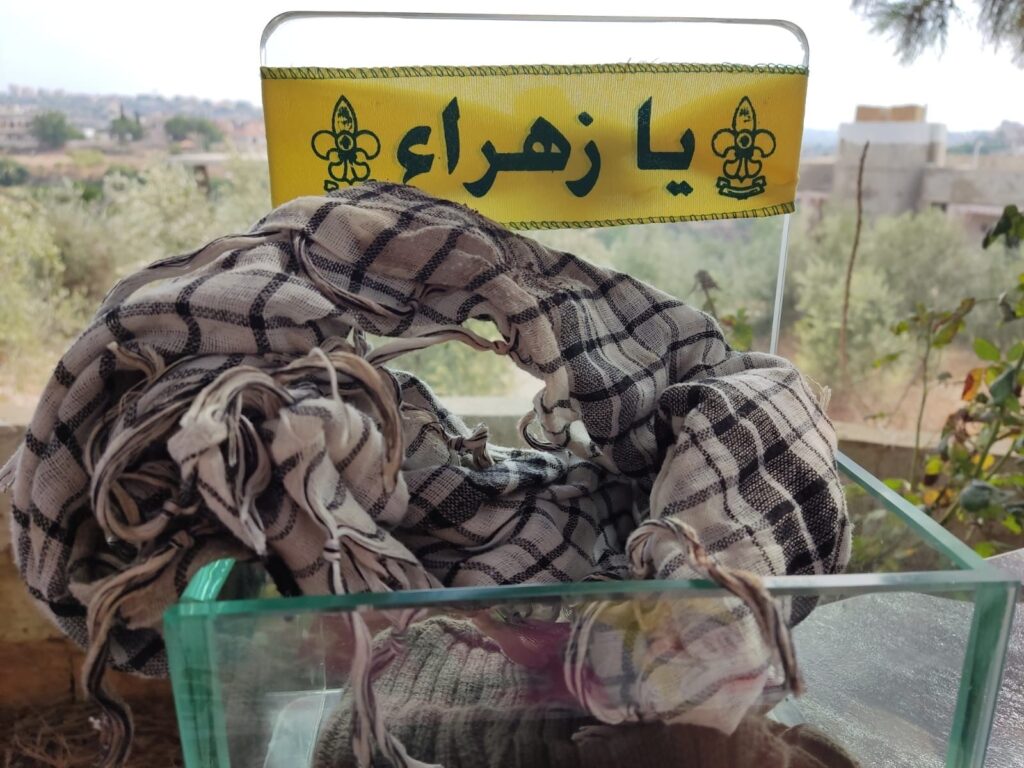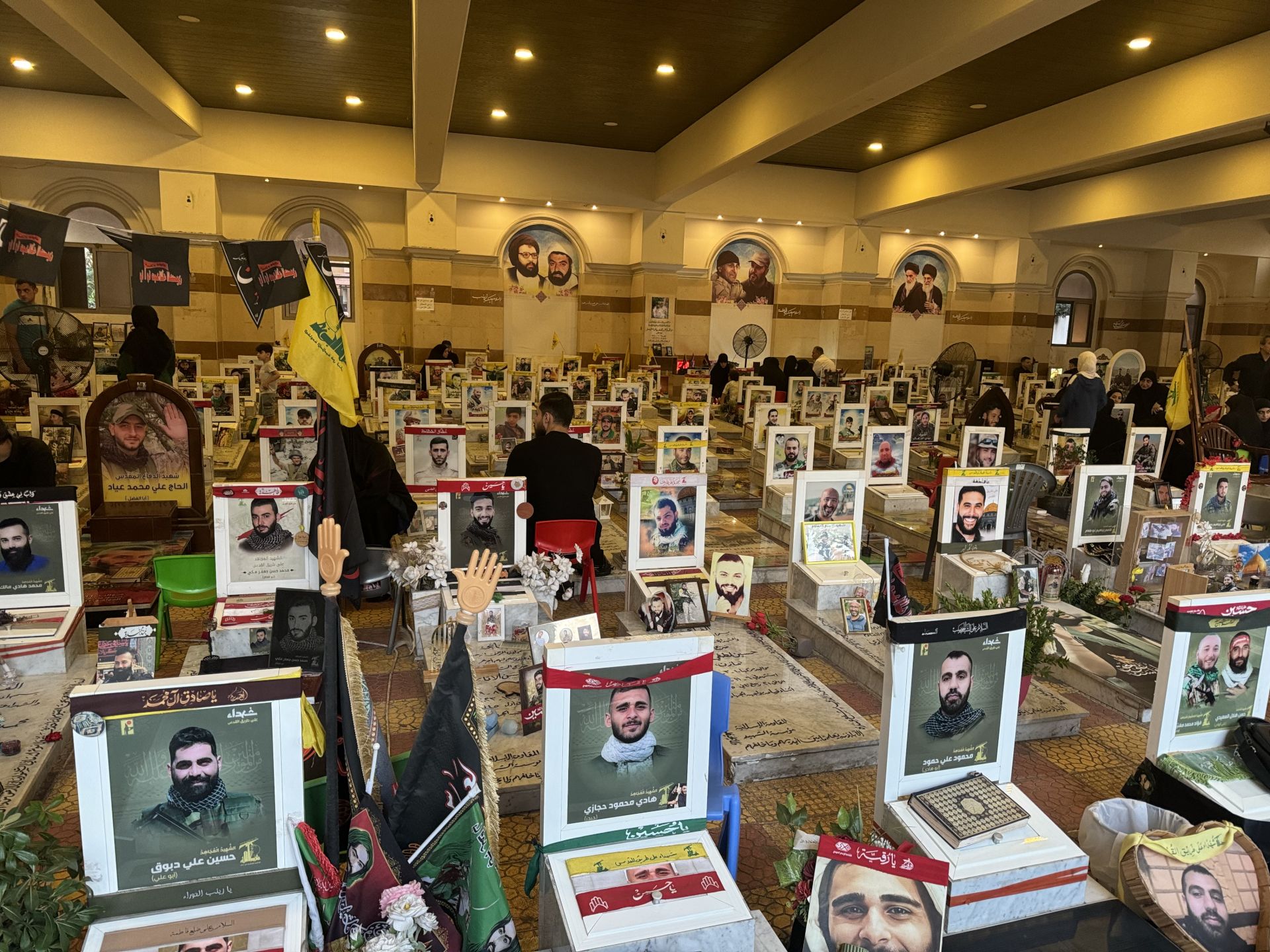About 100 tombstones crowned with photos of young men cram al-Rawda cemetery in Beirut’s southern suburbs. Most are adorned with a yellow ribbon that reads in Arabic “martyrs on the path to Jerusalem.” They were all fighters for Hezbollah, Lebanon’s Shiite militia and political party, many killed in recent combat with Israel in the south of Lebanon, others in the party’s fight alongside the Bashar al-Assad regime in Syria.
“He was about to get married; he built a house,” one grieving mother in a black abaya and veil tells me. ”He had many dreams. But this is what God chose for him.”
Her son was killed three months ago while on combat duty. She sits at his tomb with her daughter and grandchildren reading the Quran, tears running down her cheeks. Not too far from her, and directly in the center of the cemetery, is the tomb of Fuad Shukr, the senior Hezbollah commander killed at the end of July in an Israeli strike on Beirut’s suburbs.
Many women congregate at the cemetery. They are there almost every day, sitting for hours, praying, cleaning and laying flowers. One of them approaches me and offers cake and dates in honor of what she described as “the martyrs.”
Since the onset of Hezbollah’s war with Israel, launched in “support” of Gaza, about 400 Hezbollah fighters have been killed, according to a tally by the French news agency AFP. The party itself has not shared any official death toll figures. But the overcrowding of the Beirut cemetery, one of many around the country dedicated to its fighters, is evidence of the growing casualties of the war for Hezbollah and Lebanon.
Hassan was 30, married with two boys, the youngest just 1, when he was killed this past January in his hometown of Ayta al-Shaab, where he lived and worked as a Hezbollah fighter for many years. His mother, Samira, granted me an interview only after I had received formal approval from Hezbollah to speak to the families of the party’s fighters. Her son was killed by shrapnel in his hip as “he was trying to save a comrade following Israeli shelling,” she tells me.
“I got to see him and kiss his face,” she says, crying. “He looked like a moon. Thank God I got to see him before they buried him. This is God’s will. It’s better for my son to die as a martyr on the road to Jerusalem than dying in a car accident or from sickness. Being a mujahid and a martyr is better.”
To Samira and other mothers I met in Beirut, dying in defense of one’s land or religion is an honor. The religious concept of martyrdom, known as “al-shahada,” is rooted for Shiite Muslims in the history of the community and the killings of Imam Ali, the Prophet Muhammad’s cousin and son-in-law and the first Shiite imam, and Imam Hussein, Muhammad’s grandson. Their martyrdom is seen as a symbol of resistance, the ultimate sacrifice for social justice, and is an inherent part of Shiite identity.
“I can’t stop my kids from going,” Samira tells me when I ask her whether she regrets Hassan’s enrollment in the party. “We are defending our country, our land. We are resisting Israel, our greatest enemy. If we hide our children, who will defend our land?”
Samira is the mother of six children, though only Hassan joined the ranks of Hezbollah. He was the middle child, devoted to religion early on in his life, praying and fasting every day. He was also a fearless and reckless boy, according to his mother, who “always threw himself in harm’s way. He has been like this since he was a kid. He had many motorbike accidents.”
At just 13, Hassan started skipping school without his parents’ knowledge and enrolled with Hezbollah.
“He would pretend to go to school and skip it and go to military training,” she recalls. “He never graduated from university. He graduated with martyrdom. That’s the highest achievement.”
But, while Hassan joined Hezbollah directly, many of the fighters have their start with the party’s scout group, the Imam al-Mahdi Scouts.
Hussein was just 3 when his mother, Walaa, enrolled him in the Hezbollah-affiliated scouts. She shows me the many certificates he received there: religious education diplomas, sports and military training certificates and recognition badges. She saved them all in a glass memorabilia case along with the boots he was wearing when he was killed, his military hat and other personal items.

Walaa, who lives in an impoverished area in Beirut’s suburbs, has turned her living room into a memorial for her son, with giant poster photos plastered over the walls and a cutout board of him standing in military uniform and smiling. She also keeps a photo of Hezbollah’s leader, Hassan Nasrallah, on the main table. She says she is a Hezbollah militant and writer.
The al-Mahdi Scouts group provides children with a curriculum that includes religion and the party’s doctrinal teachings, sports training, scouts’ camps and, eventually, military training, according to Walaa, who says the military preparation is “voluntary.” Hussein was the only one among her children to enroll, while the others went on to marry and migrated to Africa for work.
“He was born the day Imam Ali was martyred,” she says. “It was raining all day. When he was born, the rain stopped. I looked at him and wondered, if a child is born the night of the martyrdom of the greatest man in my opinion, will he graduate from this life as a martyr?” She smiles. “And so he did.”
As a child, her son was “disobedient,” “vigorous” and often “violent,” she says.
“He had a lot of energy. He fought a lot with his classmates, the parents would complain. He reacted rapidly. But it is always in defense of someone or something.”
Hussein was only 20 when he was killed fighting in Syria. He had been a fighter with Hezbollah for some years before. At first, Walaa was opposed to his enrolling in the Syrian war.
“I told him, ‘I brought you to this world to defend Palestine but not to get involved in an internal war in Syria.’ I was against that. A brother killing his brother,” she says.
Hezbollah’s involvement in the Syrian conflict to protect Assad divided and triggered criticism within the Shiite community, whose youth were being sent to Syria often without the knowledge of their families. Hussein fought in Syria many times before his parents found out about it.
“The first time he went to Syria with our knowledge he came to say goodbye and he extended his hand to me. I refused to shake it or kiss it. I was upset. I did not want him to go. I was against that war. I cried a lot.”
Eventually, her son convinced her of the need to fight in Syria against the Islamic State group “to protect Lebanon and protect Shiite religious sites from their evil.” Her biggest fear was not that he would be killed, she says, but that he would be taken hostage by the Islamic State. “He told me that if they were taken hostage, they had a fatwa [a ruling or edict on a point of Islamic law] to blow himself up.”
Walaa, like a mother sending her child to school, packed Hussein’s bag every time he went to the front line.
“I would pack all the nuts he liked. I would shop for the best cotton underwear for him because I knew he lasted days without a shower. He would laugh and tell me, ‘Mother I am not going to get married.’”
From the time he was 9, Hussein had been in love with the daughter of a Hezbollah commander. But they never had the opportunity to marry. I asked her if she would have rather seen him wedded.
“I choose life for my children, no doubt. We are the people of life. My son loved a woman and we asked for her hand. But her father wanted them to go to university first, then get married. The year he went to university is the year he was martyred.”
Hezbollah’s leader, Nasrallah, claims his party has over 100,000 trained fighters ready to mobilize in the war against Israel. That figure cannot be independently verified. Joining the party’s military ranks can be a full-time job. Hezbollah fighters are on a monthly payroll, and while there is no official or public salary scale, their income ranges between $500 a month to thousands for more senior commanders, according to families I spoke to.
“He was in charge of all of our finances before he was martyred,” Walaa says of Hussein. “He was well off. He was building a home above the house of his brother. The house was never finished.”
The financial stability continues after the death of a fighter. The parents of the “martyr” receive a monthly lifetime allowance of $250, and if the fighter is married the spouse gets $750 and the entire family is entitled, through Hezbollah’s Martyrs’ Foundation, to a number of social services including free education and healthcare. Amid the unprecedented economic crisis in Lebanon since 2019, as well as the absence of state support and social benefits, this income becomes an important safety net for the families.
Not too far from Walaa’s home, I travel to see Zaynab, who also goes by “Om Khodr” (mother of Khodr). She lives in the south of Lebanon despite the daily Israeli shelling but has made the journey to Beirut especially for the interview. Her son Khodr was another young fighter who enrolled in Hezbollah’s scouts as a child and ended up being killed at the age of 20.
“My son was martyred, not killed,” she insists. “I am still the mother of four; he is still with me. I still feel him at home. I did not lose him. I miss him and I cry, but I won him in the afterlife. Martyrs are alive with God.”
Just like Walaa, Zaynab has preserved the personal items of her son in a box she keeps at home. She shows me a photo of it on her phone. It includes a blood-stained scarf that the first-aid respondent used to try to save his life.
“It was the hardest moment of my life,” she says about finding out about his death. “I don’t recall much. I was told I did not scream. I probably had a shock.”

Khodr was never outgoing, according to his mother. He was a homebody and a religious man who “loved women in abayas” and went to Iraq for pilgrimage.
“The night before his martyrdom, he called his friend and told him he saw Sayida Zahraa (the daughter of the prophet). She tapped his shoulder and told him to come with her. So, he knew it was his time to go.”
Zaynab is composed in our conversation, hiding her pain as much as possible, although it is visible to me.
“Nobody loves war,” she tells me when I ask her about the situation in the country’s south, “but when it is imposed on you, you have to defend yourself.” Regarding Israel, “If we don’t hit them, they will hit us anyway.”
“Martyrdom is not the objective — it’s the victory,” she says. “The other day I saw him in my dream. He had two kids with him. He told me they were his.” She smiles.
“Spotlight” is a newsletter about underreported cultural trends and news from around the world, emailed to subscribers twice a week. Sign up here.



